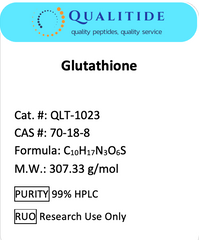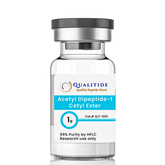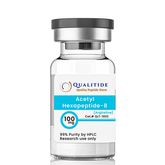Product Usage: This PRODUCT, exclusively offered by Qualitide, is for RESEARCH USE ONLY. It is intended for in vitro testing and laboratory experimentation. All information on this website serves educational purposes only. Introducing this product into humans or animals is illegal. It must be managed by licensed professionals only. This is not a drug, food, or cosmetic and should not be branded or misused as such.






Description
xL-Glutathione is a short peptide composed of just cysteine, glutamate, and glycine. It occurs naturally throughout the body and acts primarily as an antioxidant and as a supportive agent to a number of processes in the central nervous system. Glutathione is especially important in the detoxification processes of the liver and as a free-radical scavenger in the brain. There is ample evidence to suggest that loss of glutathione can contribute to neurodegenerative diseases like Parkinson’s disease as well as eye diseases like cataracts and diabetic retinopathy. Reduced glutathione levels are thought to be both a consequence of aging as well as a contributor to the aging process. Chronic disease also reduces glutathione levels.
In biochemistry, two forms are commonly discussed. The oxidized form (glutathione disulfide) and the reduced form (glutathione) transform one into the other in living organisms with the help of enzymes and the action of reducing/oxidizing agents. Only reduced glutathione is biologically active. It is typically written as GSH because the -SH thiol group is the reducing part of the molecule. GSH works in conjunction with endogenous glutathione peroxidase and establishes the oxido-reduction mechanism.
By forming nonreactive molecules, Glutathione neutralizes hydrogen peroxide as well as oxygenated radicals that have disruptive effects on lipids, proteins, enzymes, and cellular DNA.
Functions:Antioxidant
CAS Number(s): 70-18-8
Molecular Formula: C10H17N3O6S
Molecular Weight: 307.32
FDA UNII: GAN16C9B8O
Glutathione Is an Antioxidant
L-Glutathione has long been recognized as one of the most important low-molecular weight antioxidants synthesized by cells of the body. By virtue of the sulfur contained in the cysteine component of GSH, it is able to remove potent free radicals, such as peroxides, nitrogen dioxide, HOCl, and a multitude of other toxins, from the body. It does this through a basic redox reaction, thus protecting cells, DNA, and extracellular matrix components from the damage done by free radicals. Glutathione not only neutralizes free radicals directly, but also assists other antioxidants, such as vitamins C and E, in their roles as antioxidants.
Glutathione is found both inside cells and as a secreted substance in the extracellular matrix. It is found in very high levels in lung tissue, the brain, and the liver. It is synthesized in humans via a simple redox reaction.
L-Glutathione's Biological Roles
Thanks to its potent antioxidative activity, Glutathione is considered as a wonderful cosmetic ingredient to eliminate free radicals in skin when exposed to UV lights which is associated with the process of aging in skin. Glutathione is also important for the human body that deficiency has been associated with a wide range of diseases such as diabetes, HIV, cancer, and even tuberculosis. Research suggests that glutathione levels may be an important marker of disease severity and progression. Dietary supplement of Glutathione peptide may help to slow the aging process in skin and maintain normal function of the brain and liver.
While glutathione is best known for its antioxidant functions, the peptide does play other roles in the human body. It is an important, indeed required, molecule in the production of leukotrienes (inflammatory mediators) and prostaglandins. This makes it a potent regulator of certain immune responses as well as the inflammatory cascade. It is also a cofactor in a number of biochemical reactions and enhances the function of citrulline in the nitric oxide cycle. In other words, glutathione is an essential component of cellular metabolism and particularly important in regulating blood pressure and cardiac health.
Glutathione is also critical to proper protein folding in the endoplasmic reticulum. Research shows that glutathione helps proteins to fold into the correct 3D shape to bind to receptors and function normally. It is particularly important in the formation of disulfide bonds. Though it is not the only mechanism that cells harbor to promote proper protein folding, glutathione is an important aspect of this cellular function and thus contributes heavily to the proper functioning of cells.
There is currently some debate as to whether glutathione acts a neurotransmitter. It certainly modulates the redox states of things like the NMDA receptor (a function that would make it a neuromodulator). It also appears to activate ionotropic receptors as well as the purinergic P2X7 receptor on Muller cells. Muller cells are found in the retina where they maintain the structure and function of retinal cells. This includes the regulation of neurotransmitter levels. This, again, suggests that even if glutathione is not a neurotransmitter, it plays an important role in the regulation of neurotransmitters.
The world’s foremost expert on glutathione is Dr. Nayan Patel. In 2020 he wrote a book entitled The Glutathione Revolution in which he discusses the benefits and safety of glutathione supplementation. He likens oxidation in the body to rust, an apt analogy if ever there was one. Glutathione is the body’s main rust preventative, warding off all of the negative consequences of oxidation in the body in the same way that proper care of your car wards off rust and the detrimental effects it has on everything. According to Dr. Patel, glutathione levels drop by about 20% after age 40, setting us up for poor performance, increased risk of disease, and accelerated aging. The only way to overcome this deficit is through supplementation.
L-Glutathione and Aging
Oxidative damage to cells is one of the leading components of both the visual signs of aging as well as aging processes like senescence (cellular/tissue aging), hormonal aging, metabolic aging, and DNA damage that led to both disease and dysfunction. Given the importance of glutathione in fighting against oxidative damage, it should come as no surprise that the peptide is critical to reducing the effects of aging.
Of course, glutathione itself, as discussed, is subject to the effects of aging. With age comes a decrease in the capacity of most mammals to synthesize glutathione. Fortunately, supplementation is possible. Research, shows, however, that the best forms of glutathione supplementation are either injecting the peptide or inhaling it through a nasal preparation. Injection provides for the easiest administration of large doses of glutathione is the method most commonly used in research studies.
Benefits of glutathione for skin
There are several benefits to glutathione because of its potent antioxidant activity: the ability to fight oxidative damage over time, to help restore skin’s barrier and as mentioned, to help improve the look of discolorations and promote an even skin tone. Research has found that when applied directly to dark spots, glutathione on skin improved the look of sun-exposed areas. Research also shows that glutathione supplementation is beneficial in reducing the outward signs of aging, particularly in the skin. A moderate dose of glutathione, given over 12 weeks, has been shown to reduce the appearance of wrinkles, improve skin elasticity, and reduce photo-aging. Supplementation leads to fewer age spots and overall “lighter” skin as a result of reducing melanin synthesis. Reduced melanin synthesis like contributes to a reduction in skin cancer incidence as well.
How long does it take for glutathione to show results?
One study found that a 2% concentration of a glutathione cream for skin improved the melanin index (a measure of melanin in skin) on dark spots when used twice a day for 10 weeks (6). As with most ingredients that help with fading discolorations, patience is key! It took years to build up the sun damage that caused those discolorations, so it takes time to lessen their appearance.
Of course, no skin brightening regime is complete without daily application (and reapplication!) of a sunscreen rated SPF 30 or higher to maintain the results you’re working to achieve.
Glutathione for skin brightening dullness
Glutathione applied topically can help restore skin’s natural, youthful glow. Since, as mentioned above, a decline in our body’s natural amount of glutathione can lead to signs of aging – which include a dull complexion – adding it to your skin care routine can help improve the appearance of skin for a more even, revitalized look.
Can glutathione help with dark spots?
Because of its role in melanin formation in the skin and its ability to interrupt an enzyme that causes melanin overproduction as mentioned earlier, glutathione "can influence the pheomelanin pathway providing a more even skin tone and to reduce the formation of free radicals that develop after intense exposure to UV light and environmental pollution", according to board-certified dermatologist, Dr. Corey L. Hartman MD.
L-Glutathione and the Brain
Decreased glutathione levels are associated with the common signs of aging as well as more serious disorders like neurodegenerative disease. In particular, glutathione pathology plays a prominent and perhaps pivotal role in the onset of Parkinson’s disease (PD). New research indicates that glutathione is a potent mediator of a process called iron-dependent cell death or ferroptosis. Without glutathione, this type of programmed cell death runs uncontrolled in cells of the central nervous system, causing premature aging and contributing to the development of neurodegenerative disease. Abundant research shows that supplementation with glutathione or its precursors (e.g. N-acetyl cysteine) is especially useful in offsetting neurological aging.
The role of glutathione in the brain is also made obvious by the decline in glutathione levels with age. Research shows that while glutathione levels decline throughout the body with age, a result of a diminished capacity for production, levels decline most dramatically in the brain. This makes the brain more susceptible to both Parkinson’s disease and damage following stroke or other insult.
The decline in glutathione levels in the brain is particularly critical in times of stress. Mild stress normally induces an increase in glutathione production to protect against more severe stress, but the decline in synthetic capacity with age erodes this response. Thus, the older we get, the more susceptible we are to stress-induced neuronal damage. Offsetting this with N-acetyl cysteine supplementation is only partially effective because the synthetic machinery itself is compromised with age. Thus, research suggests that directly injecting (or inhaling) glutathione is the best way to boost levels of this antioxidant and prevent stress-related damage to the central nervous system.
L-Glutathione Summary
Glutathione is a potent antioxidant and regulator of a number of biochemical processes. It is abundant in human tissues, but subject to decline with aging. Research shows that glutathione can help to maintain more youthful skin, reduce aging process in brain, eyes, liver and immune system.
Glutathione exhibits minimal side effects, low oral and excellent subcutaneous bioavailability in mice. Per kg dosage in mice does not scale to humans. Please be aware that Glutathione for sale at Qualitide is limited to educational and scientific research only, not for human consumption. Only buy Glutathione if you are a licensed researcher.
Shipping & Return
xReturns Policy
At Qualitide, we are committed to ensuring your satisfaction with our products. Our Satisfaction Guarantee policy allows you to return or exchange any item within 14 days of receiving your order if you are not completely satisfied. Return/Exchange Eligibility To be eligible for a return or exchange: The item must be in its original condition as received, unworn or unused, with tags attached, and in its original packaging. You must provide the receipt or proof of purchase..
If you need to return an item, simply login to your account, view the order using the "Complete Orders" link under the My Account menu and click the Return Item(s) button. We'll notify you via e-mail of your refund once we've received and processed the returned item.
Shipping
At QUALITIDE, we aim to make your shopping experience simple and smooth. Here’s how we handle shipping: Processing Time We process all orders within 0 to 1 business day. Orders placed after business hours, on weekends, or on holidays will be processed the next business day. Delivery Time Once processed, delivery takes 2 to 3 business days, depending on your location and the shipping carrier. Total Delivery Time From placing your order to receiving it, the total time is 2 to 4 business days, including both processing and shipping.
Disclaimer
xAll articles and product information provided on this website are for informational and educational purposes only. The products offered on Qualitides are intended solely for in-vitro research purposes. In-vitro studies ("in glass" studies) are conducted outside of the body. These products are not medicines or drugs and have not been evaluated or approved by the FDA to prevent, treat, diagnose, or cure any medical condition, ailment, or disease. Any form of bodily introduction or administration of these products into humans or animals is strictly prohibited by law. By using this website, you acknowledge and agree to comply with all applicable regulations and restrictions related to the products provided by Qualitides.
- Choosing a selection results in a full page refresh.








